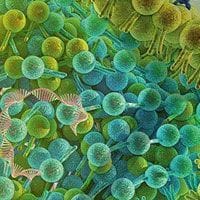Their groundbreaking work paved the way for the rapid development of effective mRNA vaccines against COVID-19. Learn more about their winning research and explore related articles by Karikó and Weissman published in ACS journals.

Katalin Karikó, Ph.D., and Drew Weissman, M.D., Ph.D., were awarded the 2023 Nobel Prize in Physiology or Medicine “for their discoveries concerning nucleoside base modifications that enabled the development of effective mRNA vaccines against COVID-19." Their groundbreaking research revolutionized our understanding of how our immune systems interact with mRNA, enabling record-time development of highly effective mRNA vaccines for the COVID-19 virus.
Even before the successful implementation of this new mRNA technology, vaccines had made significant progress throughout the years. Traditional vaccines relied on weakened or inactivated viruses to trigger an immune response—one example being the vaccine against yellow fever, which received Nobel recognition in 1951. Over the next several decades, vaccine development evolved to accommodate specific viral components or genetic code fragments, such as those used against hepatitis B and HPV. However, these approaches were resource-intensive and unsuitable for rapid response to outbreaks and pandemics.
Enter mRNA vaccines, a promising concept rooted in the universal principles of chemistry and molecular biology. In the 1980s, research surrounding the use of in vitro-produced mRNA for vaccines emerged, but challenges such as mRNA stability and inflammatory responses to the in vitro transcribed mRNA hindered progress.

Recent Advances in mRNA Vaccines
Undeterred by these challenges, Karikó and Weissman began working together in the 1990s to further advance mRNA’s therapeutic potential. They discovered that by chemically modifying the bases of in vitro transcribed mRNA, they were able to drastically reduce the inflammatory response. This, combined with their subsequent discovery that the modified mRNA significantly increased protein production upon delivery, helped further pave the way for successful clinical applications.
During the COVID-19 pandemic, Karikó's and Weissman's seminal work in this area made it possible for high-efficacy, base-modified mRNA vaccines to be developed at unprecedented speeds, saving millions of lives and helping the world regain a sense of safety and normalcy. Their contributions proved instrumental in a time of severe global crisis, exemplifying the profound impact of scientific discovery on our lives.
Explore Related Research from Katalin Karikó and Drew Weissman Published in ACS Journals
Targeted and Equally Distributed Delivery of mRNA to Organs with Pentaerythritol-Based One-Component Ionizable Amphiphilic Janus Dendrimers
Juncheng Lu, Elena N. Atochina-Vasserman, Devendra S. Maurya, Dipankar Sahoo, Nathan Ona, Erin K. Reagan, Houping Ni, Drew Weissman*, and Virgil Percec*
DOI: 10.1021/jacs.3c07337
Ionizable Lipid Nanoparticles for Therapeutic Base Editing of Congenital Brain Disease
Rohan Palanki, Sourav K. Bose, Apeksha Dave, Brandon M. White, Cara Berkowitz, Valerie Luks, Fazeela Yaqoob, Emily Han, Kelsey L. Swingle, Pallavi Menon, Emily Hodgson, Arijit Biswas, Margaret M. Billingsley, Li Li, Fan Yiping, Marco Carpenter, Alexandra Trokhan, Julie Yeo, Nuryanti Johana, Tan Yi Wan, Mohamad-Gabriel Alameh, Frederick Chris Bennett, Phillip B. Storm, Rajan Jain, Jerry Chan, Drew Weissman, Michael J. Mitchell*, and William H. Peranteau*
DOI: 10.1021/acsnano.3c02268
Ionizable Lipid Nanoparticles for In Vivo mRNA Delivery to the Placenta during Pregnancy
Kelsey L. Swingle, Hannah C. Safford, Hannah C. Geisler, Alex G. Hamilton, Ajay S. Thatte, Margaret M. Billingsley, Ryann A. Joseph, Kaitlin Mrksich, Marshall S. Padilla, Aditi A. Ghalsasi, Mohamad-Gabriel Alameh, Drew Weissman, and Michael J. Mitchell*
DOI: 10.1021/jacs.2c12893
Rational Design of Bisphosphonate Lipid-like Materials for mRNA Delivery to the Bone Microenvironment
Lulu Xue, Ningqiang Gong, Sarah J. Shepherd, Xinhong Xiong, Xueyang Liao, Xuexiang Han, Gan Zhao, Chao Song, Xisha Huang, Hanwen Zhang, Marshall S. Padilla, Jingya Qin, Yi Shi, Mohamad-Gabriel Alameh, Darrin J. Pochan, Karin Wang, Fanxin Long, Drew Weissman, and Michael J. Mitchell*
DOI: 10.1021/jacs.2c02706
The Unexpected Importance of the Primary Structure of the Hydrophobic Part of One-Component Ionizable Amphiphilic Janus Dendrimers in Targeted mRNA Delivery Activity
Dapeng Zhang, Elena N. Atochina-Vasserman, Juncheng Lu, Devendra S. Maurya, Qi Xiao, Matthew Liu, Jasper Adamson, Nathan Ona, Erin K. Reagan, Houping Ni, Drew Weissman*, and Virgil Percec*
DOI: 10.1021/jacs.2c00273
Targeted Delivery of mRNA with One-Component Ionizable Amphiphilic Janus Dendrimers
Dapeng Zhang, Elena N. Atochina-Vasserman, Devendra S. Maurya, Matthew Liu, Qi Xiao, Juncheng Lu, George Lauri, Nathan Ona, Erin K. Reagan, Houping Ni, Drew Weissman*, and Virgil Percec*
DOI: 10.1021/jacs.1c09585
One-Component Multifunctional Sequence-Defined Ionizable Amphiphilic Janus Dendrimer Delivery Systems for mRNA
Dapeng Zhang, Elena N. Atochina-Vasserman, Devendra S. Maurya, Ning Huang, Qi Xiao, Nathan Ona, Matthew Liu, Hamna Shahnawaz, Houping Ni, Kyunghee Kim, Margaret M. Billingsley, Darrin J. Pochan, Michael J. Mitchell, Drew Weissman*, and Virgil Percec*
DOI: 10.1021/jacs.1c05813
Scalable mRNA and siRNA Lipid Nanoparticle Production Using a Parallelized Microfluidic Device
Sarah J. Shepherd, Claude C. Warzecha, Sagar Yadavali, Rakan El-Mayta, Mohamad-Gabriel Alameh, Lili Wang, Drew Weissman, James M. Wilson, David Issadore*, and Michael J. Mitchell*
DOI: 10.1021/acs.nanolett.1c01353
2- and 8-Azido photoaffinity probes. 1. Enzymic synthesis, characterization and biological properties of 2- and 8-azido photoprobes of 2-5A and photolabeling of 2-5A binding proteins
Robert J. Suhadolnik, Katalin Kariko, Robert W. Sobol, Jr., Shi Wu Li, Nancy L. Reichenbach, and Boyd E. Haley
DOI: 10.1021/bi00424a023
Phosphorothioate analogs of 2',5'-oligoadenylate. Enzymatically synthesized 2',5'-phosphorothioate dimer and trimer: unequivocal structural assignment and activation of 2',5'-oligoadenylate-dependent endoribonuclease
Katalin Kariko, Robert W. Sobol, Jr., Lorraine Suhadolnik, Shi Wu Li, Nancy Lee Reichenbach, Robert J. Suhadolnik, Ramamurthy Charubala, and Wolfgang Pfleiderer
DOI: 10.1021/bi00396a039
Phosphorothioate analogs of 2',5'-oligoadenylate. Activation of 2',5'-oligoadenylate-dependent endoribonuclease by 2',5'-phosphorothioate cores and 5'-monophosphates
Katalin Kariko, Shi Wu Li, Robert W. Sobol, Jr., Robert J. Suhadolnik, Ramamurthy Charubala, and Wolfgang Pfleiderer
DOI: 10.1021/bi00396a040
Phosphorothioate analogs of 2',5'-oligoadenylate. Enzymic synthesis, properties, and biological activities of 2',5'-phosphorothioates from adenosine 5'-O-(2-thiotriphosphate) and adenosine 5'-O-(3-thiotriphosphate)
Robert J. Suhadolnik, Choongeun Lee, Katalin Kariko, and Shi Wu Li
DOI: 10.1021/bi00396a041